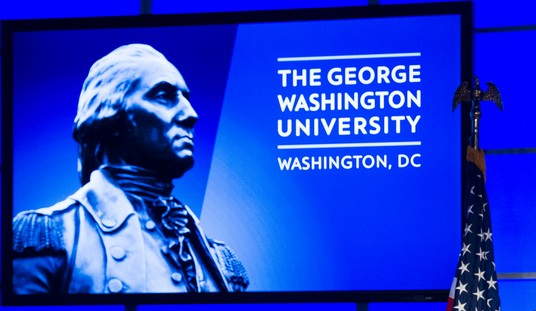Towards the beginning of Edgar Allan Poe’s macabre romance “The Fall of the House of Usher,” the unnamed narrator describes his first sight of that gloomy old pile. Among other eldritch features, he noticed “a barely perceptible fissure, which, extending from the roof of the building in front, made its way down the wall in a zigzag direction, until it became lost in the sullen waters of the tarn” below the house.
Careful observers will have noted analogous fissures in what, for lack of a better term, I will call the “progressive consensus.” “Progressive” is not quite right, because there is no progress—if by progress you mean movement from a given point to something better. But “progressive” is preferable to that other favored verbal specimen of evasiveness, “liberal.” As the word’s etymology suggests, “liberal” has to do with liberty, with freedom, and there is no mainstream ideology in modern Western democracies that is more inimical to freedom than “liberalism.” If you doubt that, try starting a business or uttering a “non-progressive” sentiment on college, running a bakery, hobby shop, or jeweler’s. It is a curiosity of our times that many words now signify more or less the opposite of what they originally meant. This is not, of course, an entirely new development. “Sanctimonious” once meant “holy.” Now it means “pretending to be holy, while actually being venal.” Just so, “liberal” once meant “on the side of freedom.” Now it generally means “pretending to be on the side of freedom while actually working to enforce conformity and intolerance.” Again, a quick look at life on almost any college campus today will illustrate the truth of this assertion.
The interesting, the hopeful, development is that House-of-Usher-like fissures seem to be penetrating the adamantine carapace of that “liberal” consensus. You can infer that partly from the increasingly surreal quality of what goes on under the aegis of so-called progressive ideology. The level of hysteria is a good index of the extent of their desperation. Consider this bulletin, just sent to me this morning by a friend, from the Board of Trustees of Bryn Mawr College outlining their new “inclusive” guidelines for undergraduate admission:
After months [Months!] of study and consultation, the Board of Trustees of Bryn Mawr College voted at its Feb. 7 meeting to accept the recommendation of its board working group charged with reviewing the College’s mission with regard to transgender, non-binary [!] and gender nonconforming applicants.
Specifically, the board-accepted recommendation . . . more clearly articulates the eligible undergraduate applicant pool. In addition to those applicants who were assigned female at birth, the applicant pool will be inclusive of transwomen and of intersex individuals who live and identify as women at the time of application. Intersex individuals who do not identify as male are also eligible for admission [Whew!]. Those assigned female at birth who have taken medical or legal steps to identify as male are not eligible for admission [Too bad!].
In cases where an applicant’s gender identity is not clearly reflected in their application materials, the College may request additional information, which could include verifiable legal or medical steps taken to affirm gender. In evaluating such additional information, the College fully intends to be as flexible and inclusive as possible [Who would doubt it?].
You might think I am making this up. I wondered at first whether it came from The Onion. But no, the link to the Bryn Mawr site seems legit. I submit that the correct word for this new policy is not “inclusive” but “insane”—“sad” and “pathetic,” too, no doubt, especially for the creatures it is intended to cater to, but definitely “insane.” Any parents who were thinking of sending their delicately brought up progeny—especially the ones that were “assigned female at birth,” or, in ordinary language, are girls—any parents, I say, who were contemplating Bryn Mawr will want to ponder carefully the implications of this extraordinary directive.
I do not discount the element of cynicism in this trendy new policy. Heck, even the president of the United States is on the transexual bandwagon, having mentioned this specious new category of victims in his State of the Union speech. What new opportunities for padding the administration the new policy offers! You may have a dozen deans of diversity, but how many administrators looking into the “legal or medical steps taken to affirm gender” do most campuses have? It is an opportunity for growth at a time when many colleges are facing cutbacks. And what’s to prevent an enterprising chap from applying as a woman and then deciding that “she” is a lesbian? But beyond the opportunities for fraud, emotional grandstanding, spurious claims of victimhood, and outright hucksterism, there is something else fueling this pathological bilge. The truth is, our nation’s higher educational establishment really has entered definitively upon that realm of “polymorphous perversity” and “primary narcissism” that the Sixties guru Herbert Marcuse extolled in his crack-pot countercultural bible Eros and Civilization. Is that what you want to spend $60K or more per annum financing, a celebration of perversity?
There are other sorts of fissures at work, those that rise up from the depths, bubbling up from within to crack and craze the façade of the “progressive” consensus. Consider the response to a story in yesterday’s New York Times (speaking of the “so-called ‘progressive’ consensus”) about the plight of French Muslim women (the real kind, presumably, i.e., those who were “female assigned at birth”) who are whining about how the French ban on the public display of religious symbols, in particular, the veil, has made them feel humiliated, etc. It’s the usual Times sort of story, replete even with the charge that the French, in banning the veil in public, are “engaging in a form of state racism.” What was remarkable, however, was the response to the piece. As Ann Althouse points out at her blog, far and away the most popular comment on the piece is this:
“Non-Muslims who work in the Middle East, are forced to wear ‘respectable’ clothing by their employers, or face disciplinary measures.”
“The Arab Muslims say that this demand is quite acceptable; and that this is to ensure that people adhere to local traditions and customs of the host country. So, with this same philosophy, why can’t Europeans set a similar standard for migrants?”
Take your time. As Althouse notes, “the answer to that question is obvious: Because we have a strong belief in religious freedom and personal expression.” By “we,” of course, Althouse does not mean those wedded to the so-called “progressive” consensus. But here’s the thing: comments like the above open the window a crack and the fresh air of common sense rushes in. What if more and more people began asking such questions? Asking, for example, why it is OK for Saudis to build mosques everywhere when Christians and Jews cannot even enter places like Mecca, let alone build churches or temples there? What about the principle of reciprocity?
I said above that the phrase “progressive consensus” was not quite right to describe this stultifying swamp of intolerant nonsense, but that it was better than “liberal consensus.” Better yet might be “multicultural consensus” since the term “multiculturalism” covers such a multitude of depredation. It was a comment by Glenn Reynolds that suggested this alternative to me. At Instapundit this morning, he links to Althouse’s comment about the Times piece offers his own response. “If I owned shares in multiculturalism,” he said, “I’d sell now.” Quite right. The whole house is trembling. Roderick Usher’s prematurally interred sister is about to return. Get out while you can.








Join the conversation as a VIP Member